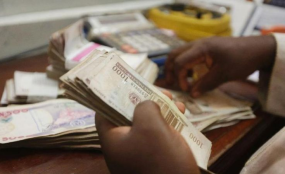By Henry Umoru
Abuja — The Senate, yesterday, urged the Central Bank of Nigeria, CBN, to urgently convert lower currency notes into coins to facilitate retail transactions in the country.
The upper chamber said it had become very imperative to make the use of coins compulsory because in developed countries as the United Kingdom, United States of America, USA; Japan, China, European Union, EU; and the entire United Arab Emirate, UAE, coins were used as means of exchange through cash transactions.
To make this very effective, the Senate has asked the CBN to sanction any commercial bank that refuses to collect coins from customers, even as it urged the apex bank to redesign the nation’s currency to cater for what it described as highly repetitive transactions of the country’s economy.
It also asked the CBN to intensify its sensitization campaign and other efforts to bring back coins into circulation in the nation’s market.
The resolutions of the Senate were sequel to a motion by Senator Mustapha Bukar (APC, Katsina North), entitled Non-usage of coin currencies in Nigeria and its negative effects on the economy.
In his presentation, Senator Mustapha Bukar said: “The Senate notes that according to the Central Bank of Nigeria, all currencies shall be legal tender in Nigeria at their face value and that Nigeria’s currency as at now comprises three coin denominations and eight note denominations, including 50kobo, N1 and N2, while the note denominations are N5, N10, N20, N100, N200, N500 and N1000.”
He noted that in Nigeria, there were two types of retail payments, the highly repetitive small value transactions such as urban transportation, sweets, cigarettes, kolanuts, vegetables, sachet water etc, as well as less frequent but high value transactions, such as clothing, footwear, raw foodstuffs, electronics etc.
He said coin currencies globally were designed to cater for the highly repetitive transactions because of the nature and conditions under which they happen, such as crowded markets, bus stations, congested traffic and varying weather conditions, including rainy, sunny and humid.
Bukar observed that countries regularly upgraded their coinage to keep pace with the prices of this category of retail items, adding that the Senate was aware of the overwhelming majority of Nigerians engaging in the highly repetitive small value transactions due to their income and locations.
He also expressed the Senate’s concern that though the nation’s currencies were in notes and coins, indications were that coins were fast going out of fashion and into extinction in Nigeria;
Bukar said the Senate also regrets the fact that coins disappeared in Nigeria because the face value of the metal used in producing it was lower than its intrinsic value, as people would always take it to black/goldsmiths to turn it into jewelry and other ornaments.

